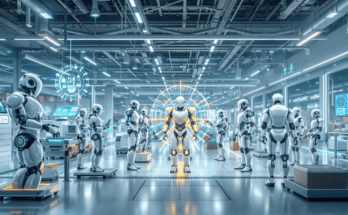Artificial intelligence (AI) is reshaping the world at an unprecedented pace, and 2025 is proving to be a pivotal year for AI innovations. From revolutionizing industries to enhancing everyday experiences, AI is driving transformative change across the globe. This blog post explores the key AI advancements shaping 2025, their impact on various sectors, and what the future holds for this dynamic technology.
The Rise of AI in 2025
AI in 2025 is no longer a futuristic concept but a practical tool integrated into daily life. Advances in machine learning, natural language processing (NLP), and computer vision have unlocked new possibilities, making AI more accessible, efficient, and versatile. These innovations are powered by increased computational capabilities, vast datasets, and collaborative efforts from tech leaders pushing the boundaries of what’s possible.

Key AI Innovations in 2025
- Generative AI Evolution
Generative AI has moved beyond creating simple text or images to producing highly personalized and context-aware content. In 2025, tools like advanced chatbots and creative AI platforms are enabling businesses to generate tailored marketing campaigns, realistic virtual environments, and even AI-driven music and art. These systems are now capable of understanding nuanced human preferences, making them invaluable for content creators and marketers. - AI-Powered Healthcare
Healthcare is undergoing a transformation with AI-driven diagnostics and treatment plans. In 2025, AI algorithms can analyze medical imaging with greater accuracy than ever, assisting doctors in early detection of diseases like cancer. Predictive models are also helping hospitals optimize resource allocation, while AI-driven wearables monitor patient health in real time, empowering individuals to take charge of their wellness. - Autonomous Systems and Robotics
Autonomous vehicles and robotics have reached new heights in 2025. Self-driving cars are becoming mainstream in urban areas, with AI systems navigating complex traffic scenarios safely. In industries like manufacturing and logistics, AI-powered robots are streamlining operations, reducing costs, and improving efficiency. These systems rely on real-time data processing and advanced sensor technology to adapt to dynamic environments. - AI in Education
Personalized learning is a reality in 2025, thanks to AI. Adaptive learning platforms analyze student performance to tailor curricula, ensuring better engagement and outcomes. Virtual tutors powered by NLP provide real-time feedback, while AI-driven analytics help educators identify at-risk students and intervene early. This is democratizing education, making quality learning accessible worldwide. - Ethical AI and Governance
As AI adoption grows, so does the focus on ethical frameworks. In 2025, governments and organizations are implementing stricter AI governance policies to address bias, privacy, and transparency. Innovations in explainable AI are making it easier to understand how algorithms make decisions, fostering trust and accountability in AI systems.
Impact Across Industries
AI’s influence in 2025 extends across multiple sectors:
- Retail and E-Commerce: AI-driven recommendation engines are boosting sales by offering hyper-personalized shopping experiences. Chatbots handle customer queries 24/7, improving satisfaction and reducing operational costs.
- Finance: AI is enhancing fraud detection, risk assessment, and algorithmic trading. In 2025, financial institutions use AI to offer personalized investment advice at scale.
- Entertainment: From AI-generated movie scripts to immersive virtual reality experiences, the entertainment industry is leveraging AI to captivate audiences in new ways.
- Agriculture: AI-powered precision farming optimizes crop yields by analyzing soil, weather, and plant health data, addressing food security challenges.
The Future of AI in 2025 and Beyond
Looking ahead, AI innovations in 2025 are setting the stage for even more groundbreaking developments. Quantum computing could further accelerate AI capabilities, enabling faster processing of complex datasets. Meanwhile, global collaboration on AI ethics will ensure responsible deployment, balancing innovation with societal well-being. As AI becomes more integrated into daily life, its potential to solve global challenges—like climate change, healthcare disparities, and education gaps—continues to grow.
FAQs
What are the most significant AI innovations in 2025?
Key innovations include advanced generative AI, AI-driven healthcare diagnostics, autonomous systems, personalized education platforms, and ethical AI frameworks.
How is AI impacting industries in 2025?
AI is transforming retail with personalized recommendations, finance with fraud detection, entertainment with immersive content, and agriculture with precision farming, among others.
Are there ethical concerns with AI in 2025?
Yes, concerns like bias, privacy, and transparency are being addressed through stricter governance and innovations in explainable AI to ensure accountability.
How is AI making education more accessible?
AI-powered adaptive learning platforms and virtual tutors tailor education to individual needs, making quality learning resources available globally.
What’s next for AI after 2025?
Future advancements may include quantum-powered AI, enhanced ethical frameworks, and solutions for global challenges like climate change and healthcare disparities.



